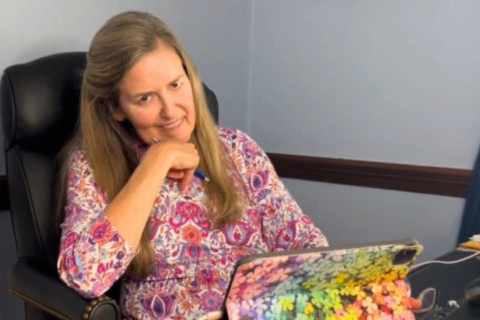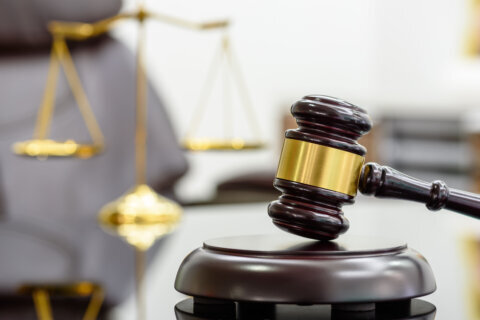This article was reprinted with permission from Virginia Mercury.
Democrats and Republicans in the General Assembly have continued to clash this session over how to handle disruptive student behavior. While Democrats are poised to pass legislation to minimize suspensions and expulsions in an effort to keep more students in the classroom and out of the school-to-prison pipeline, Republicans have unsuccessfully pushed for more uniform disciplinary systems and stricter penalties.
Del. Delores McQuinn, D-Richmond, and Sen. Stella Pekarsky, D-Fairfax, who are carrying the suspension legislation, have argued school divisions need to find alternative ways to handle disruptive students besides removing them from classrooms.
“As a legislature, I think it’s our duty to find ways to address these mounting issues, and failing to do so — and what I’ve seen in the past not only as a school board member and as an elected official, but also as a minister — we will end up going to cemeteries and jails,” said McQuinn. “I know that seems to be probably the toughest side of things, but it’s a reality.”
Pekarsky has said the proposals won’t prevent schools from disciplining students. But, she said, it will spur teachers and administrators to more uniformly adopt “best practices” in disciplining students.
Republicans, however, have opposed the change, expressing concerns that it would allow disruptions to persist in classrooms and negatively impact students’ ability to learn. Instead, they proposed a stricter approach that would have created a uniform system for how school divisions should respond to disruptive behavior and allowed law enforcement to charge students with disorderly conduct. Both proposals were killed.
Disproportionate suspensions and expulsions
Concerns about the impacts of suspensions and expulsions on students aren’t new. In 2015, the Center for Public Integrity found that Virginia led the nation in referring students to the justice system.
“Virginia schools in a single year referred students to law enforcement agencies at a rate nearly three times the national rate,” the center found. “Virginia’s referral rate: about 16 for every 1,000 students, compared to a national rate of six referrals for every 1,000 students. In Virginia, some of the individual schools with highest rates of referral — in one case 228 per 1,000 — were middle schools, whose students are usually from 11 to 14 years old.”
Those referrals disproportionately impact certain groups of students, studies have shown. The state’s Joint Legislative Audit and Review Commission found that during the 2017-18 school year, Virginia students with disabilities were more than twice as likely than their non-disabled peers to be suspended 10 or more days in a year or expelled. More than half of parents with a disabled child who had been surveyed by JLARC felt their student had been inappropriately or excessively disciplined in the past few years.
Most recently, a 2024 report from the Legal Aid Justice Center found Black students and students with disabilities are more likely than members of other groups to be removed from school as punishment for behavioral issues.
Black students make up roughly 21% of the overall K-12 enrollment in Virginia but represent nearly half of all students who have been removed from schools and placed elsewhere, the report noted. And while students with disabilities make up only 13% of the school population, they received approximately 24% of all referrals to local law enforcement for school infractions in 2022-23.
“The goal for Virginia’s public schools should be keeping students in school through appropriate staffing with counselors and administrative support and implementing restorative practices with fidelity,” said Alex Blocker, a senior organizer for the Legal Aid Justice Center, in a statement.
‘Restorative’ solutions
McQuinn and Pekarsky’s legislation would prohibit schools from suspending or expelling students if they haven’t taken other steps to address disruptive behavior within the school.
The prohibition wouldn’t apply to students who have committed certain serious acts, including firearm offenses, homicide, sexual assault and other similar crimes.
Instead, the legislation would require schools to first engage in what are known as restorative practices — a set of steps aimed at strengthening the student’s relationships with staff and other peers and repairing harm to anyone whom their behavior hurt.
Divisions would follow an approach set out in the state’s Model Guidance for Positive, Preventative Code of Student Conduct Policy and Alternatives to Suspension, a document produced by the Virginia Department of Education in 2021.
Responses could include “community conferencing, community service, mentoring, a peer jury, peer mediation, positive behavioral interventions and supports, a restorative circle,” and a state framework for providing assistance to students known as the Virginia Tiered Systems of Supports.
“This bill will simply ensure that these restorative practices are part of the disciplinary process before more severe actions are taken,” Pekarsky said.
“It is incumbent upon us as educators, as a school system, to make sure there are always consequences — there have to be consequences; that’s how we teach children — but the consequences are developmentally appropriate for the disciplinary infraction and we allow students the time to learn from their mistakes.”
– Sen. Stella Pekarsky, D-Fairfax
McQuinn said the legislation is intended to “boost” student achievement by increasing school attendance, addressing mental health challenges and encouraging conflict resolution skills.
“I’ll be the first to say we have challenges that we have all over the country as it relates to student discipline and student achievement, and I think they are intertwined,” McQuinn said during one subcommittee hearing. However, she said, lawmakers have a “moral responsibility to provide an alternative for our children instead of suspension and expulsion.”
Pekarsky said the legislation wouldn’t prevent schools from disciplining students but would instead require them to try other approaches besides removal.
“It is incumbent upon us as educators, as a school system, to make sure there are always consequences — there have to be consequences; that’s how we teach children — but the consequences are developmentally appropriate for the disciplinary infraction and we allow students the time to learn from their mistakes,” she said.
Republicans have opposed the proposals over concerns that they won’t adequately fix disciplinary issues. Del. Mike Cherry, R-Colonial Heights, said he was concerned about what precedent the legislation would set.
“My primary concern lies with the idea we are telling a school division they cannot suspend a student until they’ve done one of these practices because that literally gives them carte blanche to walk up and punch someone in the face,” Cherry said. “If you can’t suspend them, then those are the things I would be concerned about.”
Both bills remain alive as the General Assembly moves toward the March 9 end of session.
Stricter stances
Republicans meanwhile have taken a stricter stance on student discipline, proposing legislation that would allow law enforcement to charge disruptive students with disorderly conduct and creating a statewide disciplinary system for school divisions to follow. Democrats have rejected both ideas.
A bill carried by Del. Chris Obenshain, R-Roanoke, would have required the Department of Education to establish a uniform system of discipline schools would follow in addressing disruptive behavior or removing students from schools.
“The purpose of the bill is not to target those students [with disabilities], but specifically those students who are intentionally disruptive,” he said during a House Education K-12 subcommittee hearing. Instead, he continued, the intent of the bill was to provide teachers with more “support for removing students who can control their behavior, but choose not to.”
“The JLARC study showed we can’t afford to sacrifice more instructional time to the actions of a few disruptive students,” he said. “This bill returns us to some commonsense concepts of traditional discipline in the classroom and ensures we don’t penalize students who are in school to learn.”
But Teri Morgan, executive director for the Virginia Board of People with Disabilities, said the bill’s definition of disruptive behavior was “vague,” and “a number of the other provisions leave room for interpretation that would be harmful.”
The House committee killed the measure without discussion.
A different House committee also killed a bill from Del. Hillary Pugh Kent, R-Richmond County, that would have allowed a student to be criminally charged for disorderly conduct that occurs on school property, on a school bus or at a school-sponsored event.
In 2020, Virginia Democrats passed a law that prohibited students from being found guilty of disorderly conduct in public if the incident in question occurred on school property.
Kent said law enforcement and superintendents have complained the move took “a tool out of the toolbox.”
“By adding it back in, we can maintain positive learning, we can create an accurate consequence, we can prevent classroom disruptions,” she said.
However, Abbey Philips, director of policy for the Legal Aid Justice Center, said the bill would unnecessarily criminalize disruptive student behavior.
“Disorderly conduct in schools is a school issue and not a law enforcement issue, and school-based sanctions are more appropriate and proportionate,” she said.






